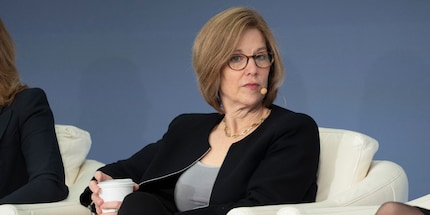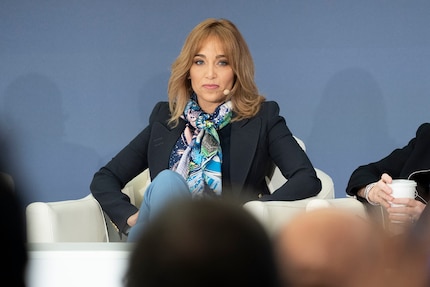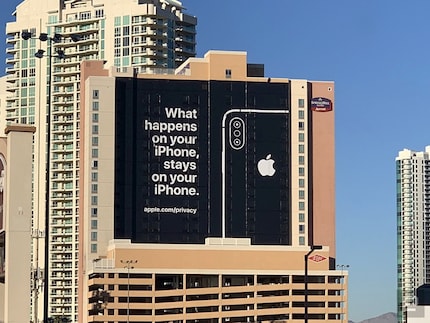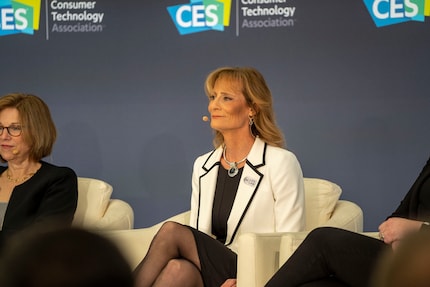CES Privacy Keynote: Facebook, Apple, Procter & Gamble and the government do the honours
Apple does the honours for the first time in ages and takes part in a panel discussion. The topic: privacy on the Internet. The panellists: Apple, Facebook, a beauty company and the US government.
The room in the North Hall of the Las Vegas Convention Centre is small. Only a few hundred fit in. And this is despite the fact that this is the first time in almost 30 years that Apple has spoken at a keynote that the company has not organised itself. It's about privacy from a corporate perspective and the key question is: What do consumers really want?
Spoiler: We still don't know in the end, but getting there was exciting.
In order to understand how this constellation came about on stage, we need to take a look at the individual participants' understanding of the topic of "privacy". To do this, we also need to look at their plans for the privacy of their users. Because Facebook is probably the biggest data slinger of our time, Apple is stubbornly holding out against it and the Federal Trade Commission is lagging behind. Somehow. And then there's Procter and Gamble

Facebook: "The Future is Private"
Facebook wants to know everything. About you, your acquaintances, friends and loved ones. Facebook even wants to know what you don't write. In 2013, researcher Sauvik Das and Facebook's Adam Kramer published a paper entitled Self-Censorship on Facebook, in which they analysed the messages not posted on Facebook. In a nutshell, this means that if you started writing a post at the time, but then didn't post it, Facebook still archived and analysed it.
As I think about the future of the internet, I believe a privacy-focused communications platform will become even more important than today's open platforms.
On 6 March 2019, however, Mark Zuckerberg, CEO of Facebook, made a statement in a Facebook note - a kind of almost forgotten Facebook blogging feature. He begins by saying that he has spent the past few years addressing Facebook's biggest problems and has realised that by solving them, he will have a significant impact on the internet as a whole. Later in the post, he admits that Facebook has made a name for itself with sharing content in public and "honestly don't have a great reputation right now as the creators of privacy protection".

But Zuckerberg is not stopping at self-recognition. He is looking to the future and the restructuring of Facebook. Of course, the public aspect will remain. But the focus will be shifted. First and foremost is messaging, which is to be private and encrypted. Zuckerberg states that even Facebook itself should not have any insight into the messages you send to others.
End-to-end encryption prevents anyone -- including us -- from seeing what people share on our services.
To this end, the permanence of content is to be reduced to the bare minimum. Stories should only be stored, archived and published for as long as necessary so that you are not harmed later. You should also be able to expect that Facebook will not store your data in countries with weak privacy protection. This is somewhat controversial, because what exactly does "weak" mean in this context? After all, the USA is in the top 20 of global privacy protectors on the part of the government, but is that enough? But Zuckerberg states that he is willing to forgo some countries as service providers or recipients.
Upholding this principle may mean that our services will get blocked in some countries, or that we won't be able to enter others anytime soon.
On the other hand, the censorship authority is making a strong case in precisely these countries. The Free Basics project aims to provide people in developing countries with a slimmed-down version of the internet free of charge. Who decides which services the Free Basics recipients receive? Facebook. The project has been called "digital colonialism" by critics, as Free Basics does not propagate the open Internet, but turns users into passive consumers of pre-recorded content. The idea behind Free Basic is not bad, but the implementation is highly questionable.
At the same time, it should be possible to find your neighbours in all Facebook apps - i.e. Facebook, WhatsApp and Instagram in particular. The services will therefore still talk to each other and exchange data between them.
At the end of his post, Zuckerberg admits that many of his plans are still in their infancy and that their realisation will be tackled in the coming years.
Apple: "Privacy is a human right"
Apple has been a giant privacy activist for years. But not necessarily just as an advocate, because Apple is big and powerful enough that the company doesn't need to engage in discussions. Apple simply does. Apple has summarised its activism - with the emphasis on "active" - on its official website in a marketing-friendly way. The slogan: Privacy is a human right.
Privacy is a fundamental human right. At Apple, it's also one of our core values.
Since Apple's communication strategy is to avoid discussions and sweeping statements, but to essentially inform humanity about their latest coup, this section is somewhat shorter and is actually a list of measures that Apple has already implemented.
- Questions to Siri will not be associated with your Apple ID. They are analysed, yes, but only under a random alias
- The images from your camera are sorted on your phone, not by AI on a server
- Safari does not track you while browsing. Although this is not 100% private, it makes analysing your browsing a little more difficult
- Your location history is also associated with a random ID, not your Apple ID. The same applies to Apple News and Apple Health
- Apple does not have access to your iMessage messages
- Apple Pay does not save your transactions
In addition, Apple is extremely transparent when it comes to the implementation of the privacy project, even publishing White Papers and Tech Briefs, in which the technological background is explained.
But Apple's communication strategy is based on portraying itself as the hero of privacy. And transparency is not Apple's strong point company-wide. Apple itself rarely communicates and if it does, then only selectively and self-congratulatory. Self-criticism from Apple is probably at most internal. End customers and the specialised press know nothing about it, if it takes place. Nor do we know what Apple is not telling us. The current situation is in Apple's favour, but no one can guarantee that it will stay that way.
Apple, according to its own claims and limited verification from privacy organisations like the Electronic Frontier Foundation (EFF), is arguably the best protector of your privacy in the modern world. But because of Apple's size and power, you have to keep in mind that Apple is powerful enough to change its position overnight and no one can stop it. Apple is currently in this role because Apple likes this role.
The event at CES shows that privacy and the protection of privacy is not only practised by Apple in its software and data management, but is also exploited for marketing purposes. Apple has not been present and spoken at a public event since 1992. Back then, Apple presented the Newton,
Exhibited perhaps, but not actually put a person on stage to speak. This only took place at events organised by Apple. However, this does not mean that Apple does not have a presence at trade fairs such as the CES in Las Vegas. Last year, the Cupertino-based company rented a building front and put up a gigantic poster there. The message was not "Buy iPhone" but "What happens on your iPhone, stays on your iPhone".

Procter & Gamble: Activism as a corporate goal
In addition to the two tech giants, Susan Shook is also on stage. She is Global Privacy Officer at the multinational Procter & Gamble. Procter & Gamble is not a tech company, but holds brands that can be found in all areas of your life. Pampers, Ariel, Always, Tampax, Head & Shoulders, Febreze, Oral-B and Gillette are just some of the brands that belong to the group. Procter & Gamble only ventures into electronics to a limited extent and only has a handful of apps in the Google Play Store, none of which are particularly invasive in terms of privacy.
There's an app that shows you public toilets, so it could log you in where you go to the toilet. Then there's an app for your Oral-B toothbrush, which uses AI to help you brush your teeth. Although your dental impression is as unique as your fingerprints, it is rarely used as an authentication factor, probably because it is a little impractical in everyday life. The most likely abuse case for a dental impression that I can think of off the top of my head is placing one on the body of a murder victim to create a false trail. I may have been watching a little too much CSI.
Even if Procter & Gamble can't throw as much data around as Apple and Facebook can, the company is still in your personal space. But the trend is clear: everything is getting smarter and more connected. If Procter & Gamble thinks about the future of data protection at an early stage and takes preventative action, certain problems might not even arise.
Another example is the BanaBak app, which offers discounts for reviews to young people in Turkish-speaking countries. A Pampers app seems to work in a similar way. These are more relevant in terms of marketing, as they collect data about your shopping behaviour and the like.
The Federal Trade Commission: The fight against lawlessness on the internet
The USA's Federal Trade Commission is on the other side of the argument. It doesn't actually care how private and encrypted people talk to each other. Of course, the FTC, represented at CES by Rebecca Salugter, also wants to protect people's privacy, but the authority is operating in a rather unique field of tension. On the one hand, people should be allowed to keep their secrets on the Internet. On the other hand, the FTC has no small interest in being able to read and listen in on everything. After all, the authority is responsible - among other things - for tracking down terrorists and child abusers and bringing them to justice.
The fact that this arrest is illegal in a healthy democracy with the presumption of innocence before the atrocity is committed escapes the government in the discussion.
The keynote: banter with good quotes
Unfortunately, the keynote itself then turns into dull blah-blah. Instead of talking to each other or delving deeper into the topic of privacy and its problems, the four women on stage speak and no one listens. Platitudes and phrases such as "Let me build on that..." followed by a rehearsed text that makes their own company look as good as possible. Facebook is turning into a privacy hero, Apple is superior to everyone anyway. What Procter & Gamble and the FTC are doing on the panel is not clear until the end, which is why they are mentioned very little.
Only Jane Horvath, Chief Privacy Officer at Apple, makes strong statements that come across well in clip shows. She speaks out against a backdoor in encryption algorithms with unmistakable clarity.
"The problem of child abuse and terrorism will not be solved by backdoors," she says.

Rightly so. Because suppose Apple installs a back door. The police authorities can now access users' iCloud data if there is reasonable suspicion of a criminal offence. This then happens two or three times in public and the criminals only use Android phones in future. Or dark matter phones. Or dumbphones. Or carrier pigeons. The fact is: the prosecuting authorities will always be one step behind the criminals.
Because Apple recognises privacy as a human right and is therefore taking an important step, the Cupertino-based company is defending itself against this game of losing.
Other than that: the speakers talk to the walls of the other speakers, the audience listens but doesn't make a particularly impressed impression. Apple wins, of course, because they have yet to apologise for any major scandal.
Meanwhile on Twitter
Much more exciting, however, is the discussion I had during the panel with Twitter user Manuel Wenger. Jane Horvath praises her company Apple for feeding differential noise - to put it simply, data rubbish - into useful data sets so that Apple itself doesn't quite know what is true and what is not. I criticise the fact that Apple could easily bypass this noise from its own company. Manuel says that Apple can't and explains this on their privacy page.
At the same time, FTC Commissioner Rebecca Slaughter makes an important point: Who is making sure that companies are actually handling our data the way they say they are?
Manuel Wenger brings the word audits into play. Independent parties are given access to all data utilisation mechanisms and their underlying protocols. They should ensure that users are not being told lies.
I'm sure the FTC would like to volunteer, but Rebecca Slaughter complains that her department has too little funding and too few employees. I have an idea: what if the Electronic Frontier Foundation (EFF) took over? As an independent, stateless institution with an inherently idealistic interest in privacy, that would be something. Manuel agrees with me with a heart under my tweet.
Merci, Manuel, for being the most exciting part of the keynote speech.
Journalist. Author. Hacker. A storyteller searching for boundaries, secrets and taboos – putting the world to paper. Not because I can but because I can’t not.
From the latest iPhone to the return of 80s fashion. The editorial team will help you make sense of it all.
Show all